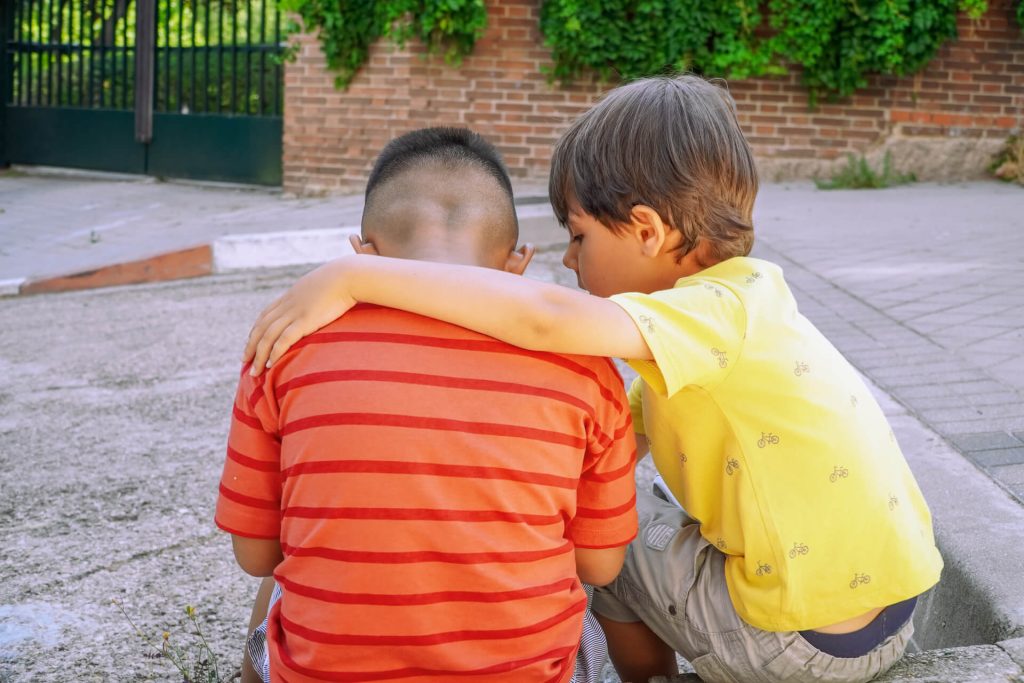Are you one of those lucky parents whose child is greeted with open arms by everyone at the playground, adored by the entire kindergarten – from the kids to the teacher to the cafeteria worker and the janitor, entertaining the entire waiting room at the pediatrician’s office with their songs and jokes, and frequently getting a free croissant or pretzel at the bakery due to their sociability and love for chatting with the staff?
These are the children everyone says: “Don’t worry about them; they’ll manage,” “You’re lucky, how free-spirited and outgoing they are!” or “Look at how they talk like an adult and aren’t embarrassed at all; they’ll go far!” If you don’t see yourself in these descriptions, then this text is for you.
The Joy of Social Interaction
Every parent would surely prefer their child to be social rather than withdrawing into themselves and avoiding social interactions. My son is one of those children who recognized the benefits of open communication very early on. When we would go for a walk, he’d enter a nearby salon just to greet the hairdressers, receiving smiles, kind words, and candies in return. When we’d board public transport, he’d ask the bus driver not only for the fare but also: “Sir, how much does the entire bus cost?” And at the playground, he’d effortlessly find a playmate by approaching a child and asking: “Do you want to play with me?” Because he always wants to help and is recognized as a leader in team games, he always has company to go outside with.
However, some children are naturally more inclined to have better-developed social intelligence and can more easily understand how social situations work and navigate them. Can this be developed, and if so, how? What measures can we take in our parenting journey to help turn our little ones into good people and brilliant minds? How can we help them acquire this value? It can be said that constant exposure to various social situations, encouragement, and support is the recipe for success.
What Does Social Intelligence Include?
What do we actually mean by intelligence? Mental attributes that encompass various abilities and skills: adapting to new situations, learning from experience, using prior knowledge, understanding abstract concepts, navigating unknown environments and circumstances…
Scientists have categorized different types of intelligence, including: linguistic, logical-mathematical, musical, visual-spatial, emotional, social, and others.
Social intelligence is a special type of intelligence, which includes several interrelated abilities such as: emotional sensitivity, social analyticity, good self-control, sociability, tolerance and social adaptability.
Natural Inclination and Fostered Development of Social Intelligence
It is common for families with more than one child to find that not all children possess the same social skills, even if they have been raised in almost identical ways. Some children are more extroverted, while others are more introverted. Some children are hesitant to leave their comfort zones.
None of us are perfect parents, but there are things we can do for our children – we can equip them with skills that will help them navigate life more easily, and developing social intelligence is something that can be highly beneficial in all areas of life. In school, college, work, everyday situations, interpersonal relationships, and partnerships, well-developed social skills can yield only positive results.
How to Encourage the Development of Social Intelligence in Your Child
What if you notice that your child is not very good at making new friends, struggles to show empathy, express their desires and needs, hesitates to join peers in play, refuses to share toys, avoids conversations with adults, answers questions shyly and briefly, and feels uncomfortable with any form of public performance?
Does your child experience fear and nervousness when speaking in front of a group of children or adults (neighbors, relatives, family friends, teachers, coaches)? Have you noticed that your child has trouble asking questions, requesting things they want, is reluctant to participate in a performance even though they like to sing, dance, and recite? They’d rather be bored or play alone than ask an unfamiliar child at the playground: “Do you want to play with me?”
Don’t worry, there are specific steps you can take to help your child acquire this value.
- Children learn by modeling, imitating our behaviors. Speak clearly, freely, politely, assertively, and respectfully.
The child is aware of communication within your home, but they also notice whether you greet neighbors in the elevator and chat with them. They hear your phone conversations. They observe how you address the cashier, teacher when you pick them up, how you talk to grandparents, your behavior toward other children, the bank clerk, or the post office clerk, a street beggar, a train conductor, etc.
Show what kindness, empathy, and effective communication look like in your relationships with family members, friends, and others. Teach them how to listen carefully, understand and respect others' feelings. Demonstrate how to clearly and politely express their thoughts and needs.
- Read stories to your child and then discuss what was read. Engage in role-playing different scenarios.
Stories with various characters and situations can be an excellent way for children to learn about interpersonal relationships. Discuss the characters' actions and the feelings they experienced.
Role-playing can be especially helpful for children who feel insecure in social situations, providing a safe space to practice and develop social skills while learning about virtues and responsibilities in society.
- Encourage communication. Actively listen when your child speaks and encourage them to express themselves. This not only develops their communication skills but also reinforces the importance of open dialogue in relationships.
Additionally, phone calls with close family members can be useful for "practicing" communication security. Teach them to talk on the phone – let them call a grandparent. This task helps the child test social skills in different contexts and develop clear and polite communication.
- Team Games and Activities: Sports, Music Groups, Choirs, Dance Groups, Workshops
Participation in team sports or group projects helps children develop collaboration and conflict resolution skills. Allow your child to participate as much as possible in activities that provide opportunities for socialization.
- Allow Your Child to Be Independent According to Their Age
Sending your child to the store can be a great way to encourage independence and responsibility. For example, you can give them a list of a few items to buy. This gives them a chance to practice decision-making, problem-solving, managing money, and interacting with sellers. It also builds the child’s confidence as they see that you trust them to complete the task independently. If the child is younger or going to the store alone for the first time, you can wait outside or nearby to make them feel more secure.
- Praise Positive Behavior
When a child shows empathy, kindness, or good communication, parents should praise and reward them, encouraging the repetition of such behavior.
In Summary
Encourage age-appropriate independence. Allowing children to make decisions and solve problems on their own builds their confidence and social skills. Expose the child to situations where they need to communicate and cooperate with peers.
Through the development of social intelligence, a child gains the ability to understand and articulate their feelings and manage them, as well as to communicate effectively and resolve conflicts with others. So, while some children may have a natural talent for social interactions, everyone can improve their social skills through learning and experience. An environment that supports the development of social skills can help a child become socially intelligent, and that is one of the most valuable gifts we can give them for the future.





